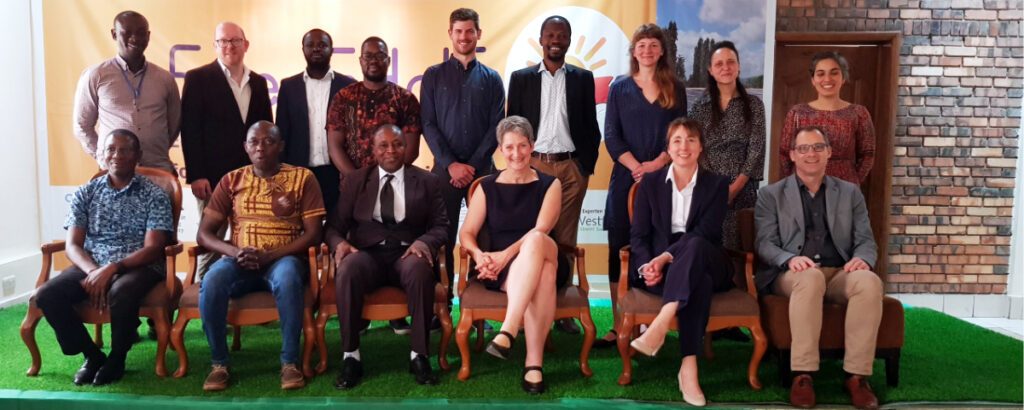EnerSHelF project ends with final trip and workshop in Ghana
5. April 2023 | Avia Linke and Katrin Lammers from the research area Off-Grid Systems at the Reiner Lemoine Institute (RLI), traveled to Ghana for the final workshop of the EnerSHelF project. On March 7, they presented the results from all work packages in a symposium in the capital Accra with partners from the participating project organizations and visited research sites. After four years, the EnerSHelF project to improve and disseminate marketable energy solutions based on photovoltaics (PV) for health care facilities in Ghana is coming to an end. The project was funded by the German Federal Ministry of Education and Research.
With this project, the scientists of the consortium installed PV systems, devices for load measurement, weather stations or battery systems at the three locations Akwatia, Kumasi and Kologo, among others, and thus collected a large amount of relevant weather and load data from health facilities.
As part of a feasibility study, RLI’s task was to model energy systems that would help with a nationwide electrification and market deployment strategy for PV hybrid systems. RLI scientists simulated load profiles and optimized energy systems based on these profiles. The data and results have been published and illustrated with a new web map for ease of use. These results can now help improve health care in Ghana through a more stable power supply using PV.
The African country’s power grid is unstable and power outages (known as ‘dumsor’ in Ghana) occur regularly. Both can cause significant damage to the healthcare system, for example when operating room lights or life-saving medical equipment simply fail.
Final workshop in Ghana’s capital
In Accra, the lead researchers of the EnerSHelF project, Katja Bender and Stefanie Meilinger from the Bonn-Rhein-Sieg University of Applied Sciences, opened the final workshop and gave a short introduction to the participants from academia, media, government agencies, industry, trade associations, health institutions and international funders. This was followed by two parallel sessions and a moderated panel discussion with representatives of the project, the Ghanaian Ministry of Health and the Ghana Health Service. In parallel sessions, project staff presented the technical and strategic research findings of the various work packages. Finally, in a panel discussion, participants discussed issues, ideas and problems related to sustainable electrification of health facilities.
Avia and Katrin say about this day: “After the joint project work and long phases of pure online meetings, it was very valuable to get to know the project partners:in person on site and to exchange ideas intensively over several days. We did the load estimation and power system modeling for the project on the computer in Europe, so it was an important experience to now be able to visit the facilities and hospitals ourselves.”
St. Dominic’s Hospital and Kwame Nkrumah University in Akwatia
Following the workshop in Accra, the project team split up. Avia and Katrin traveled with a group to the city of Akwatia, located about 100 km northwest of Accra. There they checked all PV systems and measuring devices in the hospital and handed them over to KNUST (Kwame Nkrumah University of Science and Technology). During this visit, the administrator of St. Dominic’s Hospital, Father Abban, agreed to let KNUST continue to use the hospital grounds for future weather, electricity and PV measurements in their PhD projects.
Finally, the project team was honored to accept an invitation from the Bishop of Koforidua. He expressed his gratitude for the EnerSHelF work and his interest in using the results for future PV projects. In addition, the EnerSHelF team gave a joint lecture on the project to more than 200 students at Accra Technical University (ATU), which was met with much applause.
Health center in Kologo
Another group traveled to northern Ghana to visit the health center in the city of Kologo. There, the team had installed a PV hybrid container. The delegation met with the head of Kassena Nankana Municipal, Hon. Joseph Adongo. Afterwards, members of the Naba research team visited Clifford Asobayire V, the head of the Kologo traditional area, to acknowledge the community’s support for EnerSHelF research activities.
Afterwards, staff from the Kologo Health Center welcomed the team. Together, they shared research findings and toured the operation of the solar PV system installed as part of the project. Participant:s included Hon. Joseph Adongo, Nana Clifford Asobayire, the Director of the Ghana Health Service, Benson Azure, the land owner of the health center, numerous members of the community, other traditional leaders, and staff:s of the health facility.
Recommendations for policy makers
Other outputs of the project include two policy briefs on “Improving Energy Supply for Health Facilities – Ghana Requires Interdisciplinary Perspectives” and “Exploring Conditions for Demand for Solar Systems in Ghanaian Health Facilities.” The briefings are addressed to policy makers in Ghana.
To visit the EnerSHelF project website, click here.
